Golden Retrievers facing weight challenges need comprehensive nutritional support that goes beyond simple calorie reduction. Weight management dog food provides a holistic approach to canine obesity, addressing not just weight loss but overall metabolic health, muscle preservation, and long-term wellness. These specialized formulas combine scientific formulation with palatability, ensuring Golden Retrievers receive optimal nutrition while achieving sustainable weight goals.
Unlike restrictive dieting approaches, comprehensive weight management focuses on creating balanced nutrition that supports healthy metabolism while gradually reducing excess weight. This approach makes specialized formulas ideal for Golden Retrievers who need sustained support rather than quick fixes. Understanding how these therapeutic nutrition strategies work helps owners make informed decisions about their Golden Retriever’s nutritional needs and long-term health outcomes.
Contents
- 1 Comprehensive Approach to Canine Weight Management
- 2 Evaluating the Best Weight Management Dog Food Options
- 3 Implementation Strategies for Weight Management Programs
- 4 Advanced Nutritional Strategies
- 5 Common Challenges and Advanced Solutions
- 5.1 Plateau Management and Breakthrough Strategies
- 5.2 Multi-Pet Household Management
- 5.3 Long-term Adherence and Motivation Maintenance
- 5.4 What makes weight management dog food different from regular weight loss dog food?
- 5.5 How do I choose the best weight management dog food for my Golden Retriever?
- 5.6 How long should my Golden Retriever stay on weight management dog food?
- 5.7 Can I feed weight management dog food to my Golden Retriever long-term?
- 5.8 What treats can I give my Golden Retriever on weight management dog food?
- 5.9 Is grain-free weight management dog food better for Golden Retrievers?
- 5.10 How do I transition my Golden Retriever to weight management dog food?
- 5.11 Can senior Golden Retrievers safely use weight management dog food?
- 5.12 How much weight management dog food should I feed daily?
- 5.13 What should I expect during the first month of weight management with dog food?
- 6 Final Thoughts
Comprehensive Approach to Canine Weight Management
Holistic Philosophy Behind Weight Management Dog Food
Comprehensive weight management represents a paradigm shift from traditional weight loss approaches, emphasizing overall health improvement rather than mere calorie restriction. The best dog food for weight management addresses multiple factors contributing to obesity in Golden Retrievers, including metabolic dysfunction, muscle loss, and behavioral patterns. This comprehensive approach ensures sustainable results while maintaining the energy and vitality Golden Retrievers are known for.
The science behind therapeutic nutrition recognizes that successful weight control requires supporting the body’s natural regulatory mechanisms rather than working against them. Modern formulations include ingredients that support healthy insulin function, optimize nutrient absorption, and maintain hormonal balance. These factors work synergistically to create an environment where Golden Retrievers can achieve and maintain optimal weight naturally.
Metabolic flexibility represents a key concept in formula design, referring to the body’s ability to switch between different energy sources efficiently. Quality therapeutic nutrition promotes this flexibility through balanced macronutrient profiles that support both fat burning and glucose metabolism. This dual approach helps Golden Retrievers maintain steady energy levels while losing weight gradually and sustainably.
Nutritional Science Principles
Therapeutic nutrition operates on established nutritional science principles that optimize body composition while maintaining health. Quality formulas typically contain 25-30% protein to support lean muscle maintenance during weight reduction. This protein level exceeds that found in regular dog food, reflecting the increased needs during weight management phases.
Carbohydrate management in these specialized diets focuses on glycemic control to prevent insulin spikes that promote fat storage. The best weight management dog food includes complex carbohydrates with low glycemic indices, such as sweet potatoes and legumes. These ingredients provide sustained energy without the blood sugar fluctuations that can trigger hunger and overeating in Golden Retrievers.
Fat content is carefully calibrated to provide essential fatty acids while controlling caloric density. Premium formulas typically contain 8-14% fat, with emphasis on omega-3 fatty acids from fish oil. These healthy fats support coat condition, joint health, and cognitive function while contributing to satiety and metabolic efficiency.
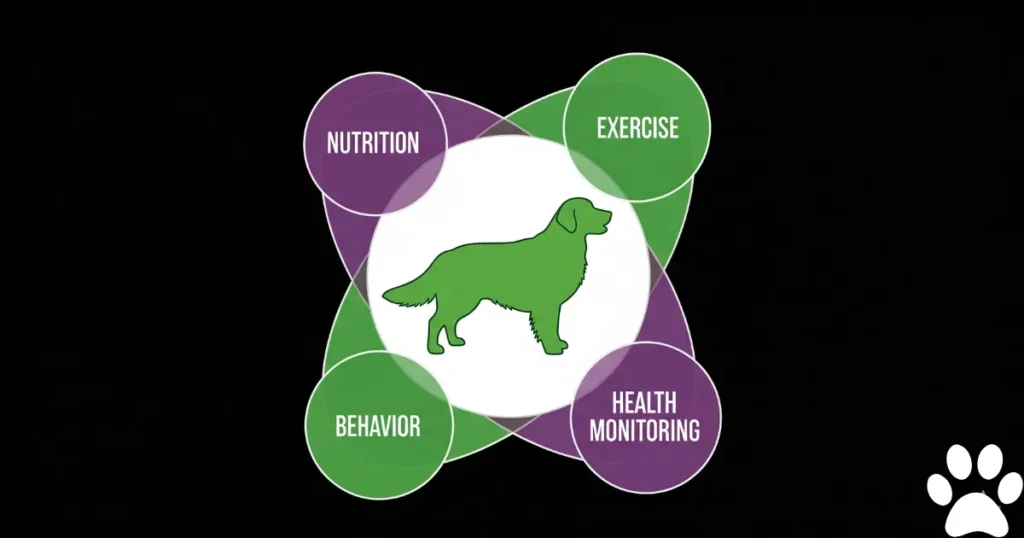
Evaluating the Best Weight Management Dog Food Options
Clinical Research and Evidence-Based Selection
Selecting quality therapeutic nutrition requires understanding the clinical research supporting different formulations. Studies on formula effectiveness typically evaluate weight loss rates, body composition changes, and biomarker improvements over 12-24 week periods. The most successful options demonstrate consistent 1-2% weekly weight loss while preserving lean muscle mass.
Peer-reviewed research on therapeutic ingredients provides valuable insights into formula effectiveness. L-carnitine supplementation in premium formulas has shown significant benefits for fat metabolism and energy production. Similarly, high-fiber ingredients have been clinically proven to enhance satiety and improve glucose regulation in overweight dogs.
Long-term studies reveal important differences between brands in terms of weight maintenance after initial loss. The best weight management dog food options show superior maintenance results, with lower rates of weight regain compared to conventional reduced-calorie formulas. This research helps identify which products provide sustainable results for Golden Retrievers.
Ingredient Analysis and Quality Assessment
Premium dog food for weight management features high-quality, bioavailable ingredients that maximize nutritional value within controlled calorie limits. The best weight management dog food lists specific protein sources like deboned chicken, turkey meal, or salmon as primary ingredients. These named proteins provide superior amino acid profiles compared to generic meat meals found in lower-quality dog food for weight management options.
Functional ingredients distinguish exceptional dog food for weight management from basic reduced-calorie formulas. The best weight management dog food includes metabolic enhancers like green tea extract, which has thermogenic properties that support fat burning. Other beneficial additions to weight management dog food include chromium for glucose metabolism and conjugated linoleic acid (CLA) for body composition improvement.
Digestibility factors significantly impact dog food for weight management effectiveness, as poorly digested ingredients can cause gastrointestinal upset and reduce nutrient absorption. The best weight management dog food incorporates easily digestible proteins and carbohydrates, often using novel protein sources for dogs with sensitivities. Prebiotics and probiotics in quality dog food for weight management support digestive health during dietary transitions.
Life Stage and Activity Level Considerations
Weight management dog food requirements vary significantly based on Golden Retriever life stages, with puppies, adults, and seniors having distinct nutritional needs. The best weight management dog food for adult Golden Retrievers focuses on maintaining muscle mass while reducing fat stores. However, senior dogs may require dog food for weight management with enhanced joint support and easily digestible proteins to address age-related changes.
Activity level dramatically influences dog food for weight management selection, as working or highly active Golden Retrievers need more calories than sedentary pets. The best weight management dog food for active dogs provides controlled calories while ensuring adequate energy for exercise and recovery. Conversely, less active Golden Retrievers may require more restrictive weight management dog food formulations to achieve weight loss goals.
Breed-specific considerations make certain dog food for weight management options more suitable for Golden Retrievers than generic formulas. The best weight management dog food for this breed addresses their predisposition to joint issues through glucosamine and chondroitin supplementation. Additionally, Golden Retrievers’ coat requirements make omega-3 fatty acids particularly important in dog food for weight management selection.
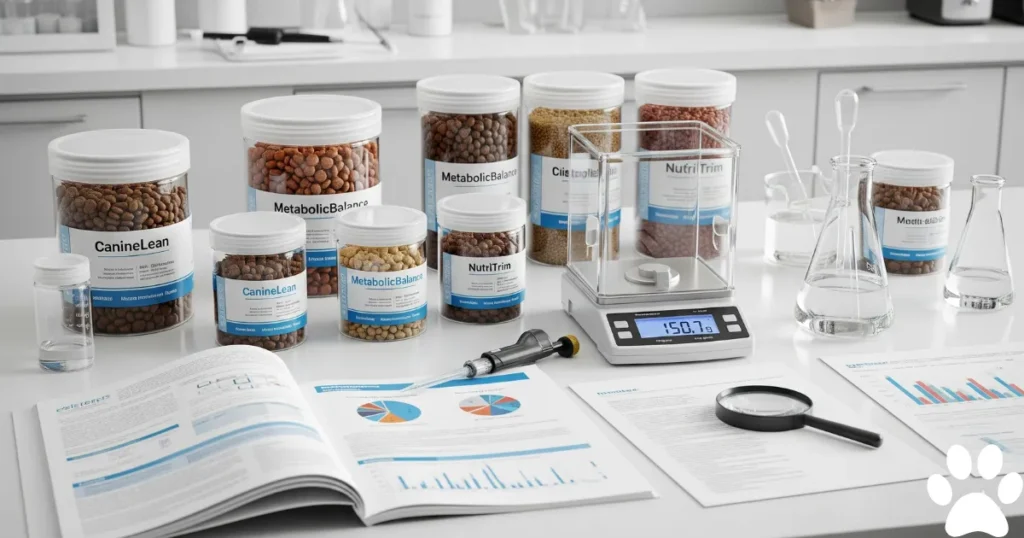
Implementation Strategies for Weight Management Programs
Veterinary Collaboration and Monitoring
Successful weight management dog food programs require veterinary oversight to ensure safety and effectiveness throughout the weight loss journey. The best weight management dog food selection should involve a veterinary assessment of the Golden Retriever’s overall health status, including thyroid function, joint condition, and cardiovascular health. This comprehensive evaluation ensures the chosen weight management dog food addresses individual health needs.
Regular monitoring of dog food for weight management programs helps identify necessary adjustments and prevents complications. Veterinary check-ups every 4-6 weeks allow for body condition scoring, weight tracking, and blood work analysis to assess metabolic responses to the best weight management dog food. This professional oversight ensures the dog food for the weight management program remains safe and effective.
Customization of weight management dog food protocols based on veterinary findings optimizes results for individual Golden Retrievers. Some dogs may require slower weight loss rates, necessitating less restrictive best weight management dog food formulations. Others may benefit from specific supplements added to their dog food for weight management to address concurrent health issues like arthritis or diabetes.
Behavioral Modification and Environmental Management
Weight management dog food success depends heavily on addressing behavioral factors that contribute to overeating in Golden Retrievers. The best weight management dog food programs incorporate training techniques that redirect food-seeking behaviors and establish healthy feeding routines. Environmental modifications, such as removing food bowls between meals, support dog food for weight management effectiveness by preventing grazing behaviors.
Family education plays a crucial role in weight management dog food program success, as all household members must consistently follow feeding protocols. The best weight management dog food results occur when everyone understands portion sizes, treat limitations, and the importance of not sharing human food. Creating clear guidelines for dog food for weight management administration prevents well-intentioned sabotage of weight loss efforts.
Enrichment activities complement dog food for weight management programs by providing mental stimulation that reduces food-focused behaviors. The best weight management dog food protocols include puzzle feeders, snuffle mats, and interactive toys that extend meal times and increase satisfaction with smaller portions. These enrichment strategies make dog food for weight management more engaging and help Golden Retrievers adapt to portion-controlled feeding.
Exercise Integration and Physical Activity Planning
Weight management dog food works synergistically with appropriate exercise programs to optimize weight loss and overall health improvement. The best weight management dog food provides adequate energy for increased physical activity while maintaining the caloric deficit necessary for weight reduction. This balance ensures Golden Retrievers have sufficient fuel for exercise without compromising weight loss goals.
Progressive exercise plans complement dog food for weight management programs by gradually increasing activity levels as Golden Retrievers lose weight and gain fitness. The best weight management dog food supports this progression through balanced nutrition that aids recovery and prevents exercise-related fatigue. Swimming, walking, and low-impact activities work particularly well with weight management dog food programs for Golden Retrievers.
Activity monitoring helps optimize the relationship between food intake and energy expenditure. The best weight management dog food programs may require caloric adjustments based on activity levels, with more active Golden Retrievers needing slightly larger portions. Fitness trackers and activity logs help fine-tune dog food for weight management portions to match individual energy needs.
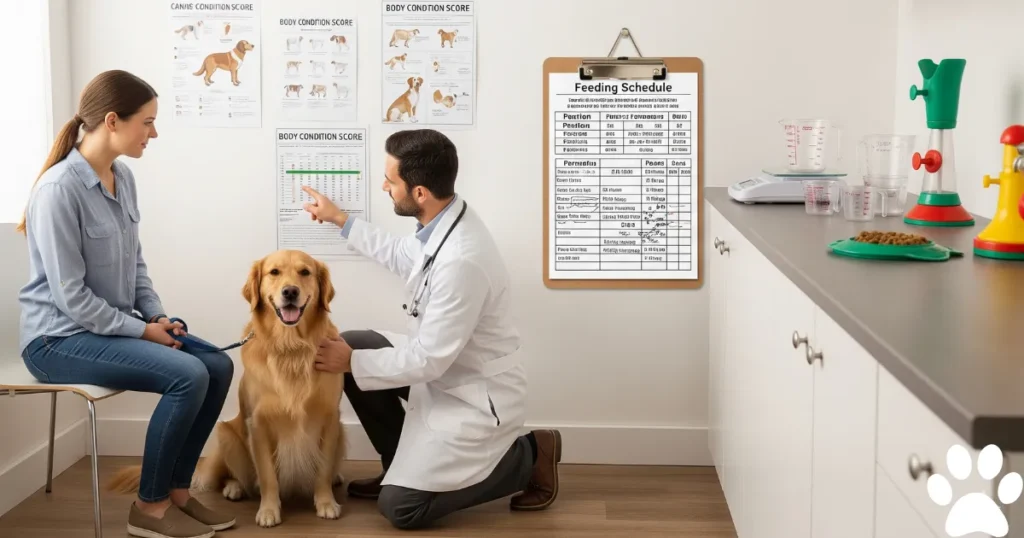
Advanced Nutritional Strategies
Metabolic Enhancement Through Targeted Nutrition
Weight management dog food can incorporate specific nutrients that enhance metabolic function beyond basic calorie control. The best weight management dog food includes metabolic boosters like medium-chain triglycerides (MCTs), which are rapidly converted to energy and may increase metabolic rate. These specialized fats in dog food provide immediate energy while supporting fat burning processes.
Thermogenic ingredients in advanced dog food formulations help increase energy expenditure through diet-induced thermogenesis. The best weight management dog food may include natural thermogenics like capsaicin or green coffee bean extract, which can modestly increase calorie burning. While effects are typically small, these additions to dog food can contribute to overall weight loss success.
Nutrient timing strategies can enhance dog food for weight management effectiveness by optimizing when specific nutrients are consumed. The best weight management dog food programs may involve feeding higher protein portions in the morning to support muscle maintenance and metabolism throughout the day. Evening meals might emphasize fiber and complex carbohydrates to promote satiety overnight.
Micronutrient Optimization for Weight Loss
Weight management dog food must provide adequate micronutrients despite reduced caloric intake, requiring careful formulation to prevent deficiencies. The best weight management dog food includes enhanced vitamin and mineral profiles to compensate for smaller portion sizes. Specific nutrients like B-vitamins become particularly important in dog food for energy metabolism support.
Antioxidant support in weight management dog food helps combat oxidative stress associated with obesity and weight loss processes. The best weight management dog food incorporates antioxidants from fruits, vegetables, and specific supplements like vitamin E and selenium. These protective compounds in dog food support cellular health during the metabolic changes occurring with weight loss.
Mineral balance in food requires special attention to ensure proper ratios despite formula modifications. The best weight management dog food maintains appropriate calcium-to-phosphorus ratios critical for Golden Retriever bone health. Iron, zinc, and other trace minerals in dog food for weight management must be carefully balanced to support metabolic functions without excess.
Personalized Nutrition Approaches
Individual response variations to dog food for weight management necessitate personalized approaches based on genetic, metabolic, and lifestyle factors. The best weight management dog food selection considers individual Golden Retriever characteristics like age, activity level, and health status. Some dogs may respond better to higher-protein food, while others may benefit from increased fiber content.
Genetic testing can inform dog food for weight management selection by identifying predispositions to certain metabolic conditions or nutrient requirements. The best weight management dog food choices may be influenced by genetic markers affecting fat metabolism, insulin sensitivity, or appetite regulation. This precision approach to dog food selection optimizes results for individual Golden Retrievers.
Biomarker monitoring allows for real-time adjustment of dog food for weight management protocols based on metabolic responses. The best weight management dog food programs incorporate regular blood work to assess glucose levels, lipid profiles, and inflammatory markers. These objective measures help fine-tune weight management dog food formulations and feeding strategies.

Common Challenges and Advanced Solutions
Plateau Management and Breakthrough Strategies
Weight loss plateaus commonly occur during weight management dog food programs as the body adapts to reduced caloric intake. The best weight management dog food protocols include strategies to overcome these plateaus through caloric cycling, formula rotation, or temporary refeeding periods. These advanced techniques prevent metabolic adaptation that can stall weight loss progress with dog food for weight management.
Hormonal changes during weight loss can affect food effectiveness, particularly in relation to hunger and satiety hormones. The best weight management dog food addresses these changes through ingredients that support healthy leptin and ghrelin levels. Fiber sources and protein quality in dog food play crucial roles in maintaining hormonal balance during weight loss.
Seasonal variations in activity and appetite can impact weight management success rates throughout the year. The best weight management dog food programs account for these natural fluctuations by adjusting portions or formulations based on seasonal needs. Golden Retrievers may require different weight management approaches during winter months when activity levels typically decrease.
Multi-Pet Household Management
Managing weight in households with multiple pets requires careful planning to ensure each animal receives appropriate nutrition. The best weight management dog food programs often necessitate separate feeding areas and scheduled meal times to prevent food sharing. Microchip-activated feeders can help ensure each pet accesses only their designated food portions.
Different dietary needs among household pets complicate dog food for weight management implementation when some animals require weight management while others need maintenance nutrition. The best weight management dog food strategies involve establishing clear feeding protocols and potentially using automatic feeders to manage individual diets. Visual supervision during meals ensures each pet consumes their appropriate food portion.
Social dynamics in multi-pet homes can affect weight management success when dominant animals monopolize food resources. The best weight management dog food management techniques include teaching “place” commands during meals and using physical barriers to ensure fair access. Some households may need to feed dogs in completely separate rooms to prevent competition.
Long-term Adherence and Motivation Maintenance
Sustaining weight management dog food programs over months or years requires strategies to maintain owner motivation and compliance. The best weight management dog food protocols include regular progress celebrations and milestone recognition to keep families engaged. Visual progress tracking through photos and measurements helps demonstrate weight management effectiveness over time.
Variety and palatability concerns may arise during extended feeding periods as dogs become bored with limited options. The best weight management dog food programs address this through approved formula rotations or safe flavor enhancers that don’t compromise weight loss goals. Maintaining interest in weight management by food helps ensure long-term program success.
Cost considerations can impact long-term adherence to weight management programs, as therapeutic formulas often cost more than regular dog food. The best weight management dog food approaches include education about long-term health cost savings and potential insurance coverage for medically necessary nutrition. Many families find that food costs are offset by reduced veterinary expenses for obesity-related conditions.

What makes weight management dog food different from regular weight loss dog food?
Dog food takes a comprehensive approach to canine obesity by addressing metabolic health, muscle preservation, and long-term sustainability rather than just calorie restriction. The best weight management dog food includes specialized ingredients like L-carnitine, thermogenic compounds, and enhanced micronutrient profiles that support overall health during weight loss. Unlike simple low calorie dog food, dog food for weight management focuses on optimizing body composition and metabolic function for lasting results.
How do I choose the best weight management dog food for my Golden Retriever?
Selecting the best weight management dog food requires considering your Golden Retriever’s age, activity level, health status, and individual preferences. Look for dog food for weight management with high-quality protein sources, controlled calories (300-350 per cup), and breed-specific benefits like joint support. The best dog food should meet AAFCO standards and include functional ingredients like omega-3 fatty acids and antioxidants. Consulting with your veterinarian helps identify which food best addresses your dog’s specific needs.
How long should my Golden Retriever stay on weight management dog food?
Duration of weight management dog food feeding depends on weight loss goals and individual response rates. Most Golden Retrievers need the best weight management dog food for 3-6 months to reach target weights, followed by a potential transition to weight control formulas. Some Golden Retrievers with genetic predispositions to weight gain may benefit from long-term feeding. Regular monitoring with your veterinarian helps determine appropriate duration and any necessary transitions to maintenance nutrition.
Can I feed weight management dog food to my Golden Retriever long-term?
Yes, weight management dog food formulated to meet AAFCO standards provides complete nutrition suitable for long-term feeding. The best weight management dog food includes all essential nutrients needed for adult Golden Retrievers, making extended feeding safe and beneficial. Many overweight-prone Golden Retrievers thrive on permanent diets that help maintain optimal weight throughout their lives. Regular veterinary monitoring ensures continued appropriateness as your dog ages.
What treats can I give my Golden Retriever on weight management dog food?
Treats should comprise no more than 10% of daily calories when using weight management dog food. The best weight management dog food programs accommodate treats by reducing main meal portions accordingly. Use small pieces of the food kibble as training rewards, or choose very low-calorie options like fresh vegetables (carrots, green beans) or freeze-dried meat in tiny amounts. Avoid high-calorie commercial treats that can undermine dog food for weight management effectiveness.
Is grain-free weight management dog food better for Golden Retrievers?
Grain-free weight management dog food isn’t automatically better unless your Golden Retriever has specific grain allergies or sensitivities. Quality grains in best weight management dog food provide beneficial fiber and nutrients that support weight management goals. Focus on overall nutritional profile, ingredient quality, and clinical results rather than grain-free marketing claims. Some grain-free food options may actually contain more calories due to alternative carbohydrate sources.
How do I transition my Golden Retriever to weight management dog food?
Transition to weight management dog food gradually over 10-14 days by mixing increasing proportions with current food. Start with 25% best weight management dog food and 75% current food for 3-4 days, then 50-50 for another 3-4 days, continuing until fully transitioned. Monitor for digestive upset during the food transition and slow the process if necessary. Sudden dietary changes can cause gastrointestinal problems that interfere with weight loss goals.
Can senior Golden Retrievers safely use weight management dog food?
Senior Golden Retrievers can safely use dog food for weight management with veterinary supervision, often benefiting significantly from weight loss. The best weight management dog food for seniors may include enhanced joint support and easily digestible proteins to address age-related changes. Weight loss through food can improve mobility and reduce strain on aging joints in senior Golden Retrievers. However, seniors may require slower weight loss rates and more frequent monitoring than younger dogs.
How much weight management dog food should I feed daily?
Daily food portions depend on your Golden Retriever’s current weight, target weight, age, and activity level. Most adult Golden Retrievers need 2-2.5 cups of best weight management dog food daily, divided into 2-3 meals. Calculate portions based on target weight rather than current weight, and adjust based on weight loss progress. The dog food packaging provides starting guidelines, but individual needs may vary, requiring portion modifications.
What should I expect during the first month of weight management with dog food?
During the first month of dog food for weight management feeding, expect gradual weight loss of 1-2% body weight weekly and possible behavioral adjustments as your Golden Retriever adapts to new portions and flavors. The best weight management dog food results include increased energy, improved mobility, and better appetite satisfaction. Some dogs may initially resist the food or show temporary digestive changes during transition. Consistent feeding schedules and patience help ensure successful adaptation to the new nutrition program.
Final Thoughts
Weight management dog food represents a comprehensive solution for Golden Retrievers struggling with obesity, offering far more than simple calorie reduction through scientifically formulated nutrition that addresses metabolic health, muscle preservation, and sustainable weight control. The best weight management dog food combines clinical research with practical application, providing Golden Retriever owners with effective tools for achieving and maintaining optimal weight in their beloved pets.
Success with weight management requires understanding that effective weight control involves addressing multiple factors, including nutrition, exercise, behavior modification, and ongoing monitoring. The best weight management dog food programs integrate these elements into cohesive approaches that support not just weight loss but overall health improvement and quality of life enhancement for Golden Retrievers of all ages.
The investment in quality dog food pays significant dividends through improved health outcomes, extended longevity, and enhanced quality of life for Golden Retrievers. Beyond the immediate benefits of weight loss, the best weight management dog food helps prevent obesity-related diseases, reduces veterinary costs, and provides years of healthy, active companionship. With proper selection, implementation, and ongoing support, dog food for weight management can transform the lives of overweight Golden Retrievers and their families.
Dr. Nabeel A.
Hi, I’m Dr. Nabeel Akram – a farm management professional by trade and a passionate Golden Retriever enthusiast at heart. With years of experience in animal science and livestock care, I’ve built a career around understanding animals—how they live, thrive, and bring value to our lives. This blog is a personal project born from that same passion, focusing on one of the most loyal and lovable breeds out there: the Golden Retriever. Whether I’m managing farm operations or sharing insights on canine health, behavior, and care, it all ties back to one core belief—animals deserve thoughtful, informed, and compassionate attention. Welcome to a space where professional expertise meets genuine love for dogs.
Facebook |
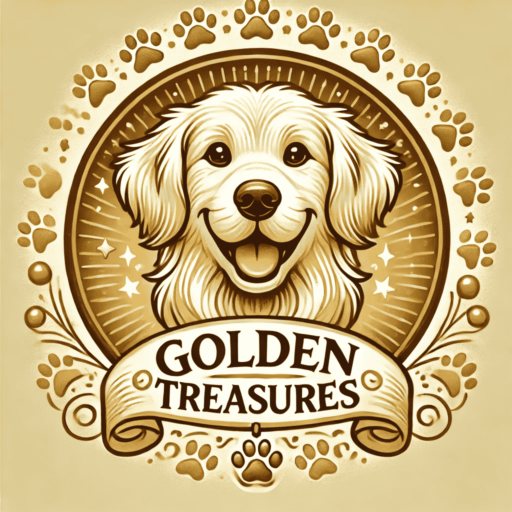
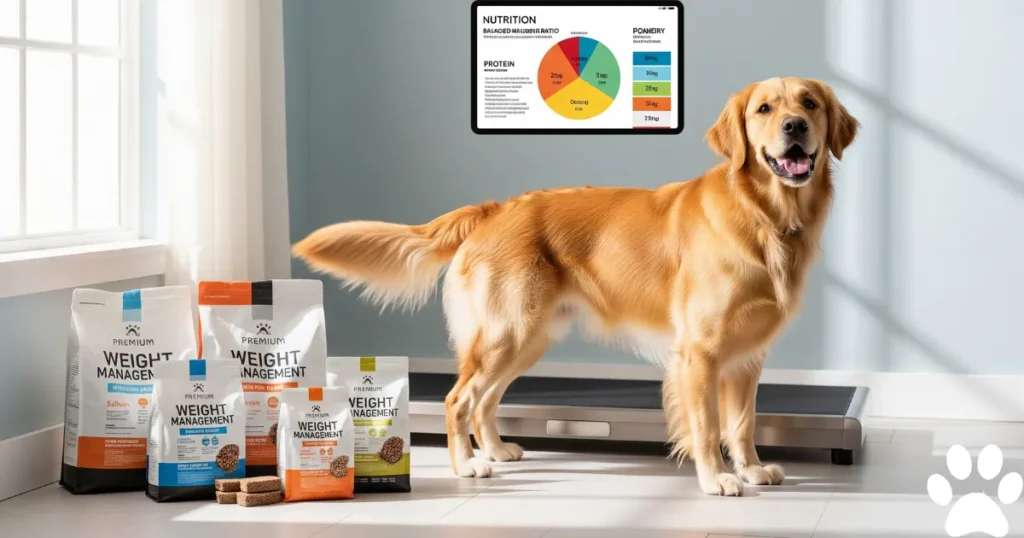
Links will be automatically removed from comments.